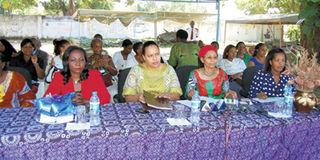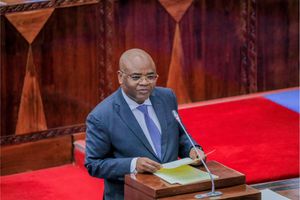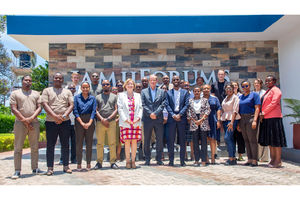TNGP launches manifesto to help push for women’s rights

Tanzanian women are now aware of their rights and want them protected in the new Constitution. Tanzania Gender Networking Programme especially is pushing for this course of action. PHOTO | file
What you need to know:
- Gender equity is a set of actions, attitudes and assumptions that provide opportunities and create expectations about individuals. Gender is never separate from race, ethnicity, language, disability, income or other diversities that define us as human beings.
Dar es Salaam. On May 8 this year, deputy minister for Legal and Constitutional Affairs Angela Kariuki launched a women’s constitutional manifesto, the event which was held at Tanzania Gender Networking Programme (TGNP) grounds.
The idea behind the manifesto was to collect women’s views from every sector in Tanzania regardless of their education, means of income, disability, rural and urban location.
This manifesto will be used as a research agenda on women’s rights that need to be included in the new Constitution. During constitutional council meetings, women will have this manifesto as their guideline on important things that the Constitution should recognise.
As opinions on what the new Constitution should address keep coming, TGNP in this women’s constitutional manifesto has proposed 18 clauses that should be included in the new parent law.
They proposed that the new Constitution should spell out principles, which would allow the implementation of the various International Labour Organisation (ILO) instruments on the right to decent work, including the rights of women to safe working environment, particularly during pregnancy.
This is the right of not being discriminated against because of being pregnant, the right to maternity leave as well as the right to access maternal and child care services.
They said the new parent law should clearly stipulate that all Tanzanians - women and men - have the right to access basic services, including water, shelter, food and social security and that the government has to take responsibility in terms of policy and legal arrangements to ensure this access.
The TGNP principal policy analyst, Prof Marjorie Mbilinyi, told The Citizen on Sunday that they had also proposed that the new Constitution should recognise that education was a basic right for both women and men and, therefore, the government should be held accountable to ensure every citizen had access to quality education from primary to higher education level.
“The government must take steps to ensure this basic right is implemented. In addition to this, the government must also be held accountable to ensure that school curricula, at all levels, within the education system emanates from a concept of gender equality and women’s rights issues should be taken into account and this should be implemented across the country,” Prof Mbilinyi said.
She said they also proposed the right to reproductive health in which the new Constitution should acknowledge the additional workload, which women bear in society and the government should ensure their safety in performing their tasks.
“Women should have the final say on family planning matters and the government should ensure women’s health and life are protected.”
They also proposed the right to social security and the new parent law should define principles, which provide the right to each citizen to have access to social security during old age and when they suffer from any disability that prohibited them from engaging fully in productive work.
“The new Constitution should provide principles, which will recognise the additional burden of care undertake in the production of human resources,” she said.
TGNP information and communications department activist Deogratius Temba said in the constitutional manifesto women proposed the new Constitution to clearly stipulate that each child had the right to be cared for by both parents and the government should ensure both men and women assumed such responsibility.
“The new Constitution should stipulate that all people with various disabilities have the right to be protected from discriminatory practices, and that the government should take measures, legal, policy and budgetary to ensure the rights of these people are respected,” he said.
“This will include the right to life, respect and dignity, accessing pubic services, including information, employment and protection.”
He said they also insisted that the new Constitution should put in place an independent body, organ or commission, which would be mandated to monitor the implementation of women’s rights in all aspects - social, political and economic.


